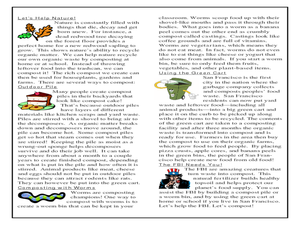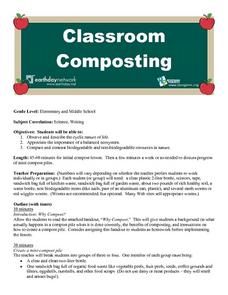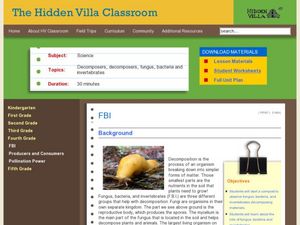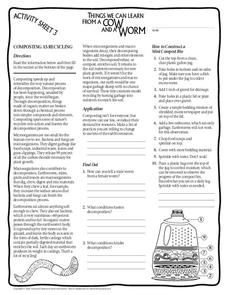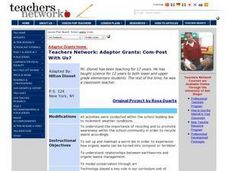Curated OER
Let's Build a Worm Bin
Students explore the process of decomposition. In this ecology and measurement lesson, students prepare a worm home to be used for vermicomposting. Students weigh a group of worms and the added food, recording this information on a data...
Curated OER
Big Fat, Juicy Worms
Students collect and study information about worms. They discover how an earthworm helps process and loosen the soil. They write in their journals as well.
Curated OER
Worm Composting: Vermiculture
Students compost in a limited space and describe the decomposing process. Students convert unwanted, organic matter, particularly food scraps and paper into fertile soil.
Curated OER
Collecting Compost
Learners observe a composting box. In this soil lesson plan, students create a composting bin by using a bin, newspaper, worms, and food scraps. Learners create a composting food web.
Curated OER
Classroom Composting
Students discover the benefits of composting. They identify the steps of decomposition as well. They are read a book and discuss what items decompose.
Curated OER
FBI
Fourth graders experiment with compost. In this Science lesson, 4th graders begin a worm compost as well as an outdoor compost. Students discuss decomposition.
Purdue University
Getting the Dirt on Decomposition
Sometimes science requires getting a little dirty. A hands-on instructional activity explores the idea of decomposition by building a compost structure. Using red worms and dirt, individuals build and collect data on the rate of...
Curated OER
Investigating the Response of Worms to Soil Improvers
The worms crawl in, the worms crawl out, but do they care what soil is all about? Find out in an easy and fun controlled experiment. Have your young biologists hypothesize, test, and draw conclusions about which type of soil worms...
Curated OER
Vermiculture Food Waste Compost Program for Touchstone School
Young scholars explore the advantages of composting. In this recycling lesson students complete a worm compost project and collect food waste to feed them.
Curated OER
Worming Your Way Through the Soil
Students study soil, living and non-living particles in the soil, and learn about composting. In this soil study lesson, students study soil samples and discuss the living and non-living components of the soil. Students classify the...
Curated OER
Causal Patterns in Ecosystems Section 3
Students design and create a worm and worm free compost tanks for observation of decay in ecosystems. They make predictions, care, and revist tanks using their journals for observation and data collection.
Curated OER
Nature's Recycling Program
Students identify what materials make up compost. In this science of recycling activity, students explain the benefits of composting determine how compost is a good plant fertilizer.
Curated OER
A Worm World
Students maintain a compost bin and build a worm observatory. They design experiments relating to worms and record observations in a worm journal.
Curated OER
Vermicomposting
First graders investigate composting. For this biology lesson, 1st graders identify ways to use garbage as fertilizer. Students examine soil and compost matter as well as the role of worms in the dirt.
Curated OER
Composting Presentations
Students create an presentation that suggests composting as a possible solution to solid waste issues. They research the types of solid waste that can be composted, the composting process and the role of worms in composting.
Curated OER
Worm Posters Presentations and Worm Box Part 2
Students work in small groups to investigate the topic, make a visual aid, and present to the class. They are given the following four topics: Worms and other decomposers, taking care of a worm box, waster and recycling, and...
Curated OER
Classroom Composting
Students observe and describe the cyclic nature of life. They identify and appreciate the importance of a balanced ecosystem. Finally, students compare and contrast biodegradable and non-biodegradable resources in nature and describe the...
Curated OER
What type of soil do worms like?- An Investigation
Students study four types of soil and predict which one worms would use for their habitat. They observe worms in each type of soil and monitor their activity. They create class charts highlighting their discoveries.
Curated OER
Recyclers Revisited
Fifth graders observe their plant experiments that they started in a previous lesson and examine the role of decomposers in the nitrogen cycle. Two weeks after they set up a worm terrarium, they analyze any changes they observe, and...
Curated OER
Composting As Recycling
In this environment worksheet, students use a milk jug and worms to demonstrate how garbage can be biodegradable in the right conditions.
Curated OER
Recyclers to the Rescue
Producers, consumers, food chains, and plants are the stars of this science lesson. Learners take part in an inquiry which helps them to discover the most effective and efficient way to grow a producer. They have a variety of containers...
Curated OER
Com-Post With Us?
Students discuss the importance of reducing, recycling and reusing materials to help the environment. As a class, they create a worm bin and observe how it turns material in to compost. They use the internet to research the...
Curated OER
Worms in a Bottle
Students gain a better understanding of the worm and its role in the recycling of organic materials into simpler forms by constructing worm bottles and observing for 60 to 90 days.
Curated OER
Vermicomposting
Third graders study vermicomposting. In this vermicomposting lesson plan, 3rd graders prepare to begin a unit on decomposition by constructing a worm bin. Students collect worms to be used later in experiments.


